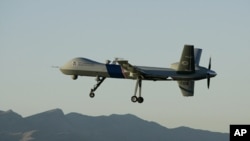The Central Intelligence Agency is said to be stepping up its counter-terrorism efforts in Yemen. Several print and broadcast news outlets say the CIA will be increasing the use of armed drone aircraft against terrorist targets in Yemen. Officials are concerned al-Qaida is seeking to exploit the uncertainty created by the country's political turmoil.
According to the reports, the CIA is planning to step up its campaign against the Yemen-based al-Qaida in the Arabian Peninsula through the use of armed unmanned drone aircraft and by building a new base at an undisclosed location in the Persian Gulf region to carry it out.
Street protests, political infighting, and increased violence have gripped Yemen, creating uncertainty. U.S. officials have in recent months voiced increased concern about the growing muscle of al-Qaida in the Arabian Peninsula, especially amid the current political turmoil.
CIA officials will not comment on the reports. But outgoing CIA director Leon Panetta, who President Obama tapped to become secretary of defense, said at his Senate confirmation hearing the situation in Yemen has not deterred counter-terrorism efforts there.
"Our approach has been to develop operations in each of these areas that will contain al-Qaida and go after them so that they have no place to escape," said Panetta. "So that we are doing that in Yemen. It is obviously a dangerous and uncertain situation, but we continue to work with elements there to try to develop counter-terrorism. We are working with JSOC [Joint Special Operations Command] as well in their operations."
Former senior CIA intelligence analyst Emile Nakhleh says al-Qaida and the United States are both stepping up their efforts in Yemen.
"Perhaps the agency [CIA] might act faster as radicals and AQAP elements - that is, al-Qaida in the Arabian Peninsula - try to take advantage of this uncertainty," said Nakhleh. "In other words, there is uncertainty, and there is more activism on the part of counter-terrorism."
U.S. strikes in Yemen are not new. The U.S. military’s Joint Special Operations Command has been coordinating with the CIA for previous attacks, usually by manned aircraft or cruise missiles, in consultation with Yemeni authorities.
President Ali Abdullah Saleh has portrayed himself as a bulwark against al-Qaida, and the United States has funneled millions of dollars in counter-terrorism aid to Yemen. In a secret U.S. embassy cable from January 2010 published by the organization WikiLeaks, President Saleh is reported as having said to U.S. General David Petraeus, “We will continue saying the bombs are ours, not yours."
But the strikes were halted about one year ago after some attacks were found to have caused civilian casualties. And now President Saleh is under siege. After resisting repeated calls for him to step down, he was wounded recently in an attack at his palace and is in Saudi Arabia undergoing treatment and recovery. His return to Yemen is uncertain.
Nakhleh says the new, heightened CIA role may be because the agency is perceived as being more nimble than the Defense Department.
"They do not have to go through all kinds of bureaucratic decision-making," he said. "They can react much more quickly, it seems to me, than the huge operation under DOD. And they have much more precise surgical targeting system and operations. If they get information about a certain nasty guy, I think that they can address that information and act on it much more quickly than a larger bureaucracy."
The editor of the Long War Journal, Bill Roggio, says the new Yemen drone program appears to be quite similar to the one targeting al-Qaida and Taliban fighters in Pakistan’s tribal regions along the Afghan border.
"Ideally you would have cooperation from the government," said Roggio. "But the use of Predators [drones] really is to me an indication of how bad things are in a country when a country can not or will not police its own terrorism problem and is basically outsourcing it to the United States for various reasons, whether it be for money or whether to maintain influence or all of the above. But regardless, it puts the United States in a really bad position because of the political blowback from locals that inevitably occurs because of these strikes."
Analysts say there is also concern U.S.-Yemeni military and intelligence relationships may be disrupted or severed in the ongoing turmoil, further unsettling counter-terrorism operations in Yemen.




